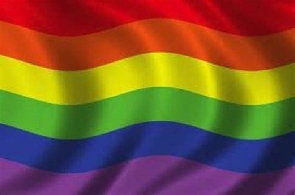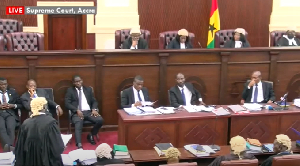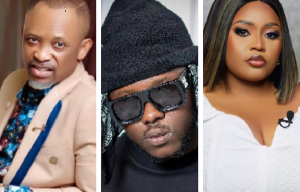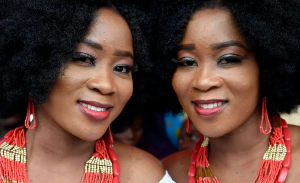Opinions of Tuesday, 18 July 2023
Columnist: Dr Isaac Tuffour
The controversy of LGBTQ+ law in Ghana: Call for a just, inclusive, and accountable society
Introduction
The recent passing of a law that targets the LGBTQ+ community in Ghana's parliament has sparked substantial domestic and international interest. The move has prompted heated controversy, with supporters arguing for the preservation of traditional cultural values and opponents arguing for the protection of human rights and inclusivity.
The law has caused international concern and prompted responses from international human rights organisations, governments, and LGBTQ+ advocacy groups. Several countries and organisations have denounced the law, claiming that it violates international human rights laws and equality principles. Diplomatic relations between Ghana and certain countries may be strained as a result.
This article will examine the effects of Ghana's LGBTQ+ bill as well as the many reactions to the legislation. It concludes by urging Ghanaian lawmakers to prioritize the enactment of anti-corruption legislation with the same level of commitment demonstrated in passing the anti-LGBTQ+ law.
Supporters
Ghana has a rich cultural and religious heritage that shapes the social fabric of the country. The new law criminalises "sexual orientation," making same-sex relationships and advocacy for LGBTQ+ rights unlawful. Supporters believe that the law attempts to preserve traditional values and customs to protect the moral fabric of Ghanaian society.
Furthermore, they believe that the law is consistent with Ghanaian religious views, values, and expectations, where homosexuality is extensively disapproved. From their standpoint, this legislation protects Ghana from perceived Western influences that may contravene Ghana's traditional and religious traditions.
To put it clearly, they consider any sexual conduct that is contrary to the norm of procreation to be a sin. So, if the legendary Okomfo Anokye, to whom the Ashanti Kingdom owes its existence, were still alive, he would fall victim to the anti-LGBTQ+ law, because it is claimed that he was able to transform into a gorgeous lady to charm and conquer some of the Kingdom's adversaries.
The proponents of the anti-LGBTQ+ law fail to grasp what is in the Bible – that we all have a sinful nature inherited from Adam and Eve thus, making it impossible for anyone to have a perfect relationship with God. Yet, John 3:5-6 states that being born-again, entitles believers to God’s blessings of mercy, sanctification and righteousness, and eternal life, irrespective of one’s sexual orientation.
Therefore, one could argue that the pejorative attitudes towards LGBTQ+ individuals in Ghana contradict Christian teachings.
Opponents
Critics, both in Ghana and abroad, view the law as a violation of human rights and an infringement on personal freedoms. They argue that LGBTQ+ people in Ghana should be protected, not persecuted, and that this law only perpetuates discrimination and marginalization.
They also express concerns about the potential consequences, including increased violence, harassment, and a hindered HIV/AIDS preventive campaign within the LGBTQ+ community in the country.
Whose freedom and justice?
On March 6, 1957, the phrase "Freedom and Justice" was chosen as Ghana's independence motto. In an opinion piece published by Graphic Online on January 18, 2017. Prof. Alex Nii Oto Dodoo commented on how our leaders at the time adopted the motto because they firmly believed "that all Ghanaians - men, women, old and young - have the right to enjoy life, liberty, and the opportunity to pursue happiness as they chose and within the laws of Ghana".
If Ghana did not previously have legislation prohibiting LGBTQ+ behaviours, and successive legislators saw no reason to pass such laws, why introduce them now, at a time when the country is at the pinnacle of development?
While the views of those who support the anti-LGBTQ+ law should be respected, there is no doubt that the law has created turmoil in the country, as it infringes upon human rights, freedom, justice, and equality for a segment of the population. Supporters of the law need to recognize that promoting moral ideals can also violate the right of others to live freely as Ghanaians.
In my opinion, a cohesive country is one that promotes equality, tolerance, and the inherent worth of every individual. Ghana sorely needs to safeguard the freedom and justice that our forefathers envisioned. Our legislators' recent display of false moral superiority should not be associated with freedom and justice.
False moral crusaders
It is frustrating that a few individuals who dominated the passage of the law in parliament portrayed themselves as moral crusaders. When passing the law, the idea of making decisions by the people, with the people, and for the people was disregarded.
There is no evidence that LGBTQ+ sympathizers were invited to express their views to parliament before the passage of the law. Indeed, it is absurd to believe that the pursuit of moral principles has taken precedence over individual choice and freedom in Ghana today. The notion that the 'powerful is right and should be feared' continues to dominate Ghanaian society.
Greed and corruption
It is no secret that a significant portion of Ghanaian society is plagued by insatiable greed and corruption. The desires of these individuals are never satisfied, as their sole aim is to amass wealth and dominate society, regardless of the consequences.
Unfortunately, institutions that should serve as watchdogs against corruption, such as the judiciary, legislature, police, security services, and public and civil servants, now selectively serve the interests of the elite classes.
We witness politicians and elite civil and public servants living lives of conspicuous opulence, owning expensive vehicles, mansions, engaging in extramarital affairs, and embarking on shopping trips abroad. It is not surprising that many people in the country aspire to become politicians or public and civil servants in lucrative sectors to escape poverty and live a luxurious.
Thus, it is not surprising that many people in the country aspire to become politicians or public and civil servants in lucrative sectors to escape poverty and live a luxurious lifestyle.
Huge legislative gap to fight corruption
There is a substantial legislative gap concerning anti-corruption laws in Ghana. While the Office of the Special Prosecutor (OSP) has the political and legislative support to combat corruption, the office lacks the capacity to investigate all corrupt activities in the country. It is evident that corruption will thrive when there is a weak capacity to fight against it.
It is perplexing that our legislators devote precious time and effort to debate and enact laws restricting the activities of LGBTQ+ individuals when the same effort could have been directed towards enacting laws to fight corruption across all sectors of Ghanaian society. Why should our legislators be preoccupied with what LGBTQ+ individuals do behind closed doors?
Is it because detractors have successfully managed to twist or conflate LGBTQ+ sexual activities with abhorrent practices such as paedophilia, sexual violence, and molestation to stir up emotions of our legislators? What about enacting laws to fight systemic corruption in the country?
Hypocrisy and corruption
The prevailing high-level and systemic corruption in Ghana adversely affects everyone in society. Sadly, corruption is a pandemic devastating the Ghanaian economy today. The illicit activities of our civil and public servants, as well as politicians, permeate every facet of Ghanaian society. Consider the police officer accepting bribes at roadside checkpoints, thereby allowing drunk drivers to endanger the lives of passengers.
Or the civil servant engaging in corrupt activities to the detriment of infrastructural development. What about the doctor or nurse who stands by while suffering patients die because they cannot afford to pay bribes for their care? Are they not just as guilty as the armed robber who steals at gunpoint? Equally, the politician who acquires wealth through corrupt means is equally culpable.
Why don’t our parliamentarians invest the same time and effort devoted to anti-LGBTQ+ laws in passionately debating anti-corruption legislation? What are they afraid of? How about passing a law that sentences a parliamentarian, politician, judge, police officer, accountant, doctor, or nurse to ten years or more in prison for engaging in corrupt activities?
It seems that the passing of the anti-LGBTQ+ law has confined Ghana to the satirical novel ‘Animal Farm’, where there is a metaphor for hypocrisy and corruption of power. The famous quote in the book that "all animals are equal, but some animals are more equal than others" speaks much about Ghana's current reality.
Need for Dialogue and Understanding
Amidst the controversy, it is crucial to promote meaningful dialogue and understanding. It is important to address the concerns and sensitivities of those who support the law while working towards fostering an inclusive environment that respects the rights and well-being of LGBTQ+ individuals. Balancing cultural heritage and human rights can be a complex matter, but finding common ground and promoting tolerance can lead to positive change.
As Ghana moves forward, it is essential to have open conversations that bridge the gaps between different perspectives. Striking a balance between cultural heritage and human rights can be challenging, but it is necessary to ensure a society that upholds both inclusivity and the preservation of cultural norms. Ultimately, the way forward must prioritize respect, understanding, and empathy for all individuals, irrespective of their sexual orientation or gender identity.













